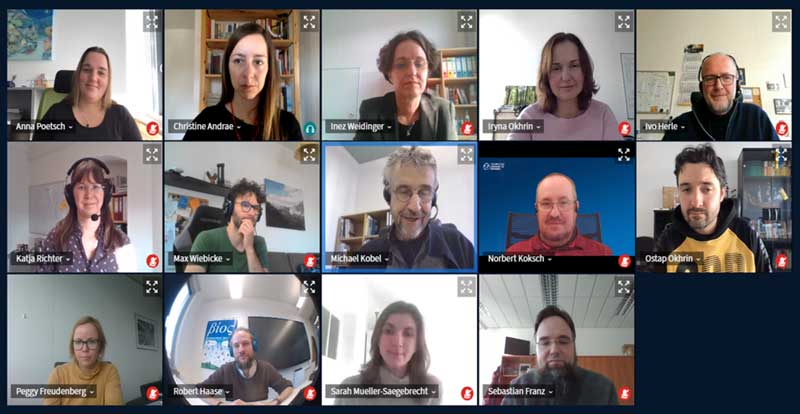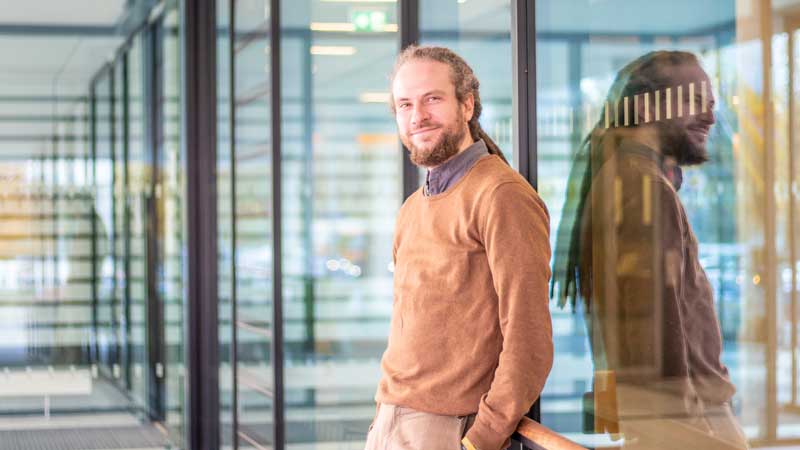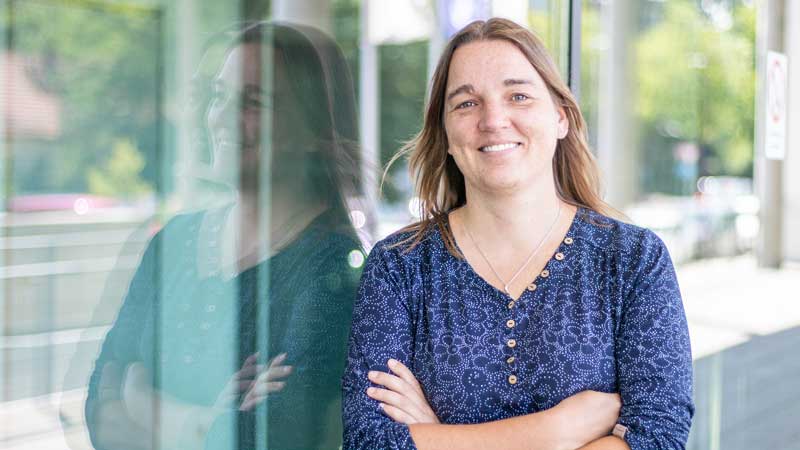Dr. Robert Haase, research group leader at the DFG Cluster of Excellence Physics of Life (PoL) at TU Dresden and the Center for Systems Biology Dresden (CSBD), and Dr. Anna Poetsch, MSNZ group leader at the Biotechnology Center of TU Dresden (BIOTEC) and National Center for Tumor Diseases (NCT/UCC Dresden), have won the Teaching Award 2021 for their joint interactive course "Bio-image analysis, bio-statistics, programming and machine learning for computational biology". During the virtual meeting of the TU Dresden Senate on January 12, 2021, all eleven award winners were announced by the Vice-Rector Academic Affairs, Prof. Michael Kobel. The prize recognizes innovative teaching and examination formats taught in digital or analog practice by lecturers of the TU Dresden in education and training and has been awarded by the Society of Friends and Supporters of the TUD e. V. since 1995.
Teaching offers under the motto “Good teaching pays off!” were sought in the academic year 2020/2021, which are characterized in particular by a high degree of creativity, interactivity and the possibility of participation. Dr. Robert Haase, project and group leader at the DFG Cluster of Excellence Physics of Life (PoL) at TU Dresden, has been working at the TUD campus since 2008 and has since been involved in image data analysis as well as teaching basic knowledge in this field. In 2020, due to the pandemic situation, he took new creative paths in order to continue to make the teaching content available to the students without restrictions. In doing so, he moved the lecture to YouTube, reaching an even larger audience. “There was a new video online every week and a virtual meeting every Tuesday to discuss and practice together. Thus, the lecture followed a very interactive flipped classroom concept. Students worked on assignments, shared their screen when there were problems, and other participants assisted in solving them. In the best practical sessions I was just the moderator.” explains Dr. Haase.
Last year, Dr. Anna Poetsch, a group leader at BIOTEC and NCT/UCC Dresden funded by the Mildred Scheel Early Career Center Dresden (MSNZ), joined the teaching offer and took over the biostatistics part of the lecture, which she made very lively with many quizzes and interactive discussions. “For me, it is always a very proud moment when I manage to get someone excited about statistics. Especially for biology students, learning a programming language gives the opportunity to develop a feeling for statistics within your own research questions. This way, one can learn the language and the content at the same time,” adds Dr. Poetsch.
By combining their expertise from different research areas and through their collaboration between the institutes, the two researchers have created a teaching format that more than meets the current challenges in teaching. “The lectures were done in interactive manner and the lecturers succeeded in involving students into the discussion. It was easy to notice that both tutors were passionate about the topics they were talking about, which is why the lectures were so inspiring, in a way that one wants to start doing a lab project with one of the lecturers right after. So far, it’s our favorite class,” enthuses a group of students who attended the course in 2021.
The prizes can be awarded to individuals or groups that provide courses from each faculty as well as courses from the central institutions. The proposals for potential award winners from the academic year 2020/2021 were submitted by students or student groups, the student councils, the deans of the faculties and the departmental spokespersons. There was a particularly high level of participation by student representatives, even across their own subject boundaries. The annual award is intended to create incentives for improving teaching at the TU Dresden and to provide impetus for new teaching ideas and concepts.
Dr. Haase and Dr. Poetsch receive prize money of EUR 2.000, which they will use to further develop their teaching offerings. “For me, it was the first lecture series of this kind and I am already looking forward to further optimizing the code, to open up further topics with this concept, and in the mid-term to offer these topics with the programming language 'R' in addition to Python,” says Dr. Poetsch. “Our teaching materials are also available online for an unlimited period of time - very much in the spirit of Open Science,” adds Dr. Haase.
As one of the eleven universities of excellence in Germany, the TU Dresden pursues the goal of further developing itself as a technical, comprehensive university with a greater disciplinary range to a national and international top-level, to realize internationally visible, excellent research in all research profiles and to implement broad interdisciplinarity on an equal basis. Innovative teaching programs such as those offered by Dr. Poetsch and Dr. Haase are central pillars for motivated students and outstandingly qualified graduates.
Further information:
Dr. Robert Haase
Email: robert.haase@tu-dresden.de
Website of the Bio-image Analysis Group: https://physics-of-life.tu-dresden.de/bia
Dr. Anna Poetsch
Email: anna.poetsch@tu-dresden.de
Website of the Research Group Biomedical Genomics: https://tu-dresden.de/cmcb/biotec/poetsch
Media contact PoL:
Bianka Claus
DFG Cluster of Excellence Physics of Life (PoL), TU Dresden
Public relations
Phone: +49 351 463-41247
Email: bianka.claus@tu-dresden.de
Media contact MSNZ:
Dr. Peggy Jungke
Mildred Scheel Early Career Center Dresden (MSNZ),
Phone: +49 351 458-11779
Email: peggy.jungke@uniklinikum-dresden.de
For more information on the Teaching Award 2021, please visit the website of the Society of Friends and Supporters of the Technische Universität Dresden e. V.


